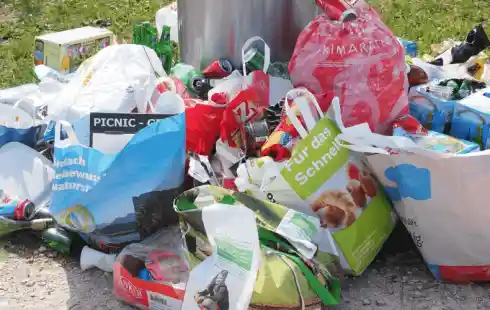
Crypto Investment Entry and Exit Strategies of Institutional Investors
Section: Business
 A recent incident in the Märkischesviertel neighborhood of Reinickendorf sheds light on the persistent challenge of addressing illegal waste accumulation in Berlin. Local authorities, alongside the Berliner Stadtreinigung (BSR), issued a call to citizens and community groups to participate in a collective clean-up effort on Königshorster Straße.
A recent incident in the Märkischesviertel neighborhood of Reinickendorf sheds light on the persistent challenge of addressing illegal waste accumulation in Berlin. Local authorities, alongside the Berliner Stadtreinigung (BSR), issued a call to citizens and community groups to participate in a collective clean-up effort on Königshorster Straße.
However, despite these efforts, a significant problem persists at a parking lot near the Thomas Mann High School. The district office clarified that the school grounds were not included in the planned cleaning operation, leaving the waste accumulation unaddressed, according to Hendrik Melz from the district sports association (BSB).
The issue appears to stem from conflicting interpretations of jurisdiction, with the public order office deeming the parking spaces and adjacent areas as private due to their association with the school and sports authority. This ambiguity has led to a cycle of responsibility shifting between various departments, resulting in a lack of action to clear the area for years, Melz criticized.
In response to mounting pressure, city councilor Julia Schrod-Thiel (CDU) took decisive action by arranging for a mobile hazardous waste removal vehicle to address the situation. Despite this intervention, community groups have long advocated for a more sustainable solution to the persistent waste accumulation.
Melz highlighted the types of waste routinely discarded illegally in the area, including building rubble, oil, roofing felt, old bicycles, and even abandoned vehicles. Additionally, he pointed out that rental fleets from car-sharing companies frequently occupy parking spaces essential for athletes from neighboring clubs.
In March, frustrated clubs submitted a collective complaint to sports and school councilor Harald Muschner (CDU), expressing discontent with the deteriorating conditions in the parking lots. According to the BSB, these grievances have persisted for two years without satisfactory resolution.
Addressing the complexities of the situation, City Councilor Julia Schrod-Thiel acknowledged the challenges in delineating responsibilities for the site. She emphasized that the BSR faced limitations in removing the waste using conventional bulky waste vehicles, necessitating coordination between departments to facilitate the removal of hazardous waste.
Assuring stakeholders of ongoing efforts, Schrod-Thiel pledged to work collaboratively with relevant departments to alleviate the parking situation and implement long-term solutions for waste management in the school and sports car park.
In conclusion, the episode in Märkischesviertel underscores the need for proactive measures to combat illegal waste accumulation and streamline responsibility across governmental departments. While immediate action has been taken to address the pressing issue, sustained efforts and cooperation are essential to prevent similar incidents in the future and ensure a cleaner, safer environment for residents and community members.
Image by Hans from Pixabay

Section: Business

Section: Arts

Section: Arts

Section: Business

Section: Business

Section: Arts

Section: Health

Section: Arts

Section: News

Section: News
Health Insurance in Germany is compulsory and sometimes complicated, not to mention expensive. As an expat, you are required to navigate this landscape within weeks of arriving, so check our FAQ on PKV. For our guide on resources and access to agents who can give you a competitive quote, try our PKV Cost comparison tool.
Germany is famous for its medical expertise and extensive number of hospitals and clinics. See this comprehensive directory of hospitals and clinics across the country, complete with links to their websites, addresses, contact info, and specializations/services.
Join us for the 10th Summer Concert at the Heilig Geist Church, featuring the captivating sounds of two trumpets accompanied by a majestic organ. This concert will showcase works by renowned composers including J.S. Bach, A. Torelli, P. Franceschini, H. Purcell, and others.



No comments yet. Be the first to comment!